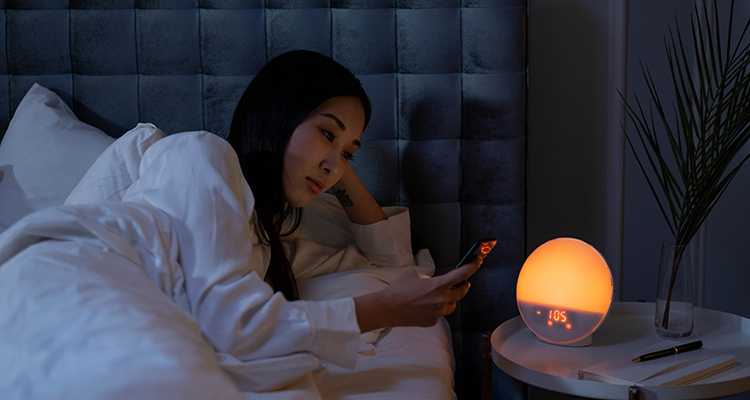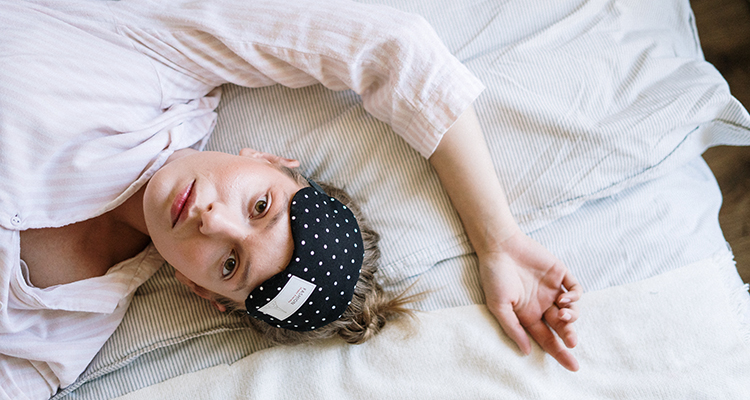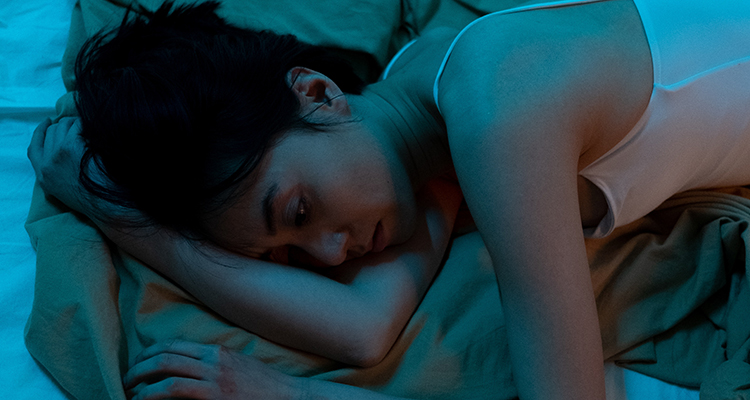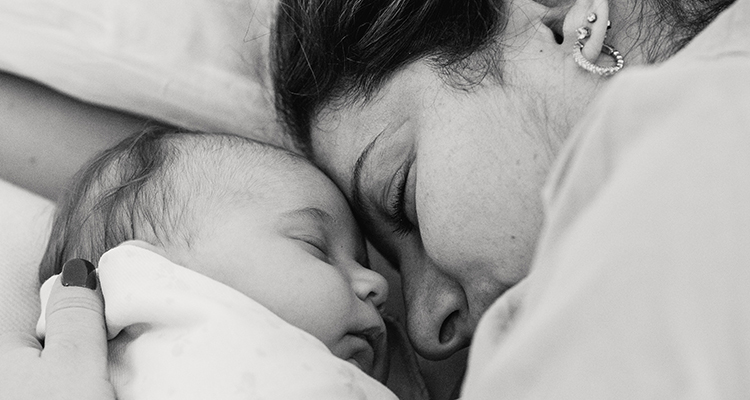Navigating Postnatal Insomnia: Hope for New Moms
Having a baby changes your life (and body) in countless ways – including how well you sleep. Women undergo a plethora of physical and emotional changes during pregnancy that impact sleep, some of which carry into the initial postpartum period. These include hormonal changes, physical discomfort, and the risk of depression and increased stress.

It’s no surprise that new parents are often sleep-deprived for months at a time. As your newborn adjusts to its new sleep schedule, you may find yourself perpetually tired. Your sleep schedule is also drastically altered as you accommodate your baby’s feeding schedule and needs.
Here we’ll discuss exactly what causes postnatal insomnia and what you can do about it. Insomnia treatment at home can help new moms get the much-needed rest they need to promote both physical and mental health. This also allows you to be present, patient, and fully engaged as your baby grows, develops, and amazes you with each passing day.
Content
What is Postnatal Insomnia?
Postnatal or postpartum insomnia describes trouble falling and staying asleep following childbirth. This can last anywhere from a few weeks to months. Insomnia is a sleep disorder that negatively affects your ability to achieve and maintain quality sleep. This occurs despite having enough time to sleep in a comfortable sleep environment. Side effects of insomnia include drowsiness, daytime fatigue, inability to focus, mood swings, and increased risk of depression. The latter is especially true for women who recently gave birth and are at risk of developing postpartum depression.

Sleep disruptions are common both during and after pregnancy. While sleep troubles and inadequate sleep are common while pregnant, many new mothers face different challenges postpartum. Frequent nighttime feedings and sleep disturbances combined with daytime naps to catch up on sleep can drastically alter your circadian rhythm and normal sleep patterns. Physical changes like swollen or engorged breasts, muscle pain, night sweats, and childbirth recovery can all impact sleep postpartum. Postnatal insomnia can also slow down the recovery process if you had a particularly complicated childbirth or cesarean section.
Women also undergo a plethora of hormonal changes in the postnatal period including a drop in progesterone and melatonin levels. Progesterone is the female sex hormone that also has sleep-inducing properties, whereas melatonin is a sleep hormone that induces sleep and promotes relaxation in both men and women. Dips in these hormone levels can also impact a woman’s circadian rhythm which regulates not only sleep but also appetite, mood, and other essential bodily functions.
Another cause of postnatal insomnia is postpartum depression which affects 1 in 8 women. Depression is a leading cause of insomnia in adults as anxious thoughts and drastic mood swings make it difficult to achieve quality sleep. Common symptoms include anxiety, extreme sadness, feelings of hopelessness, and fatigue. Women with postpartum depression either experience difficulty falling asleep or excessive sleepiness, both of which can alter a normal, healthy sleep schedule.
New mothers aren’t the only ones affected by postnatal insomnia and depression. These conditions can have serious impacts on your partner, newborn, and other children in the household. Mood swings, irritability, and an emotional disconnect can make it difficult to maintain healthy relationships. It’s also interesting to note that mothers who experience good sleep quality are less likely to develop postpartum depression.
Managing and Preventing Postnatal Insomnia
In some cases, your best defense against postnatal insomnia is a strong offense. That means making certain adjustments during and after your pregnancy to promote healthy sleep habits. If you’re still faced with sleep troubles following childbirth, some of these tips and techniques can help ease symptoms.

Education and Therapy Options
Knowledge is power when it comes to treating and preventing postnatal insomnia. The more you understand about how sleep works, what behaviors promote quality sleep, and which ones sabotage it, you can start making well-informed decisions about your sleep health.
One way to achieve this is by working with a sleep specialist, keeping a sleep journal, and exploring different forms of therapy. Cognitive-behavioral therapy (CBT) is a popular way to treat all types of insomnia, including those triggered by pregnancy and childbirth. By changing the way you think about sleep and replacing negative thoughts with more positive ones, you can adopt a healthier attitude and outlook on achieving quality sleep.
Stimulus control therapy and sleep restriction therapy are two more proven treatment options for insomnia. Stimulus control therapy is similar to CBT-i in the fact that it helps patients overcome anxieties and negative thoughts associated with sleep. Some people need to be reconditioned in order to approach sleep differently and overcome difficulty falling and staying asleep. One technique of stimulus control involves establishing that your bed is for sleep and sex only. That means not lying in bed awake for more than 15-20 minutes and eliminating non-sleep activities like working, eating, or watching television in bed. Sleep restriction therapy is similar and involves restricting how much time you spend in bed each night.
Improved Sleep Hygiene
Maintaining overall health and wellbeing is an important part of postnatal self-care. Not only does it speed up your recovery time but also prevents postpartum depression. Your sleep hygiene is just as important as your physical health and personal hygiene. This phrase refers to all daytime and nighttime behaviors that help promote quality sleep like maintaining a comfortable sleep environment, limiting caffeine and alcohol intake, eating a balanced diet, and getting plenty of physical activity.
New moms should limit alcohol intake for two very important reasons. One is if you’re breastfeeding. Studies show that alcohol consumption can lead to shortened breastfeeding duration and decreased milk production. Second, alcohol is proven to decrease sleep quality and duration. While you may experience sleepiness soon after consuming alcohol, these feelings eventually subside, resulting in fragmented sleep later on.
As a new mom, your nighttime schedule and routine will change frequently. The best thing you can do is to try and establish a loose bedtime routine that promotes relaxation and sleep. Things like limiting the use of screens and electronics too close to bedtime, drinking chamomile tea, taking a soothing bath, or writing in a sleep journal are all great ways to prepare for and induce sleep. Reading and snuggling with your baby are great choices too!
Stress-Reducing Activities
Parenthood can be stressful. It can also trigger insomnia. New moms are at particularly high risk of both postnatal insomnia and postpartum depression. By reducing stress and anxiety, you can help prevent both these conditions.
Techniques like mindfulness and meditation are especially effective and can be conveniently done anywhere. Controlled breathing is a great way to calm racing thoughts, ease anxiety, and reduce unwanted physical side effects of stress like sweating and an upset stomach. You can utilize these techniques before bed and if you struggle to fall asleep after waking for a nighttime feeding or other interruption. Another tip is to avoid turning on the TV, using your smartphone or turning on bright lights when getting up to tend to your newborn. Keep the lights low and distractions at a minimum.
Physical activity is another great way to reduce stress, plus it helps improve your mood, boost confidence, and may help shed some of that unwanted baby weight. Try exercising in the morning whenever possible. This helps you feel more alert and awake to start your day and more tired in the evening. If possible, get outside and take a walk. The natural sunlight will do wonders for your circadian rhythm. You can also put your newborn in a stroller and bring them along! Just be sure to check with your doctor before starting an exercise regime as different types of childbirth require different recovery times.
Ask for Help
There’s no shame in asking for help as a new mom. In fact, it’s encouraged! Whether it’s your partner, family, or friends, don’t be afraid to share the workload of motherhood. Not only will this help reduce your stress but it will give you time to catch up on some much-needed rest.
If possible, let your partner get up and perform nighttime feedings to reduce fragmented sleep and allow you to get a solid few hours of consecutive rest. Catching up on sleep may also involve taking daytime naps. While, in some cases, this can worsen insomnia symptoms, in the early stages and weeks following birth, getting quality sleep is a top priority – even if that means sleeping during the day. Improved sleep quality will help you feel more energized, patient, and focused. It also reduces anxiety and helps ward off feelings of postpartum depression.
Warning Signs of a More Serious Sleep Condition
If you’re facing extreme sleep disturbances following childbirth that are significantly impacting your life, it may be time to talk to your doctor. Here are a few warning signs that your postnatal insomnia may be developing into a more serious condition.

Excessive Snoring
Pregnant women are at higher risk of developing sleep apnea, a very serious and potentially harmful sleep disorder. Obstructive sleep apnea (OSA) is especially dangerous and is marked by repeated lapses in breathing. Heavy snoring, coughing, pauses in breathing, and choking episodes are all signs of OSA. Symptoms during pregnancy may continue into the postpartum period, worsening insomnia and putting you at greater risk of developing other, more serious health issues.
Involuntarily Falling Asleep
The opposite of the inability to fall asleep is involuntary onset sleep, also known as narcolepsy. This sleep disorder is extremely dangerous, especially for new moms. Nodding off during feedings, when holding your baby, or snuggling your baby could result in accidental suffocation and other tragic injuries. If you find yourself unable to stay awake when caring for your baby, you should speak to your doctor immediately.
Impaired Reaction Times
Chronic insomnia and long-term sleep deprivation can severely affect your cognitive function and reaction times. If you find yourself responding and reacting more slowly to certain situations, it may be cause for concern. For example, not reacting appropriately while driving, the inability to catch a falling object, or becoming momentarily dazed and unable to respond during a conversation are all signs that you’re not getting enough sleep. These, too, can put your newborn at unnecessary risk of injury.
Sleep Maintenance Problems
If your insomnia symptoms precipitate for longer than a few months, it may be time to speak to your doctor about alternative treatment options. Recurring sleep onset issues (the inability to fall asleep) and increased difficulty falling back to sleep after waking up to care for your infant, can cause long-term, serious health complications. You may also experience increased mood swings, irritability, and a higher risk of developing postpartum depression.
Signs of Postpartum Depression
Postnatal insomnia can easily snowball into postpartum depression. Lack of sleep puts strain on both your physical and mental wellbeing. Without adequate rest, you’ll experience extreme mood swings including irritability, agitation, and frustration. You may also start to feel isolated from friends and family, lonely, sad, and increasingly hopeless. All of these are signs of postpartum depression. If you fear that your insomnia is causing postpartum depression symptoms, speak with your doctor about potential remedies and treatment options. Treating your postnatal insomnia can prevent postpartum depression and, in turn, easing depression symptoms may improve your sleep quality.
Enjoy Your Newborn AND Quality Sleep
It’s true! New mothers can enjoy those precious moments with their newborns and still get quality sleep. While the first weeks following the birth of your little one, you may experience extreme fatigue, fragmented sleep, and hormonal changes, knowing how to handle these hurdles is half the battle. Allow your partner, family, and friends to lend a helping hand whenever possible. Get quality sleep when you can and maintain healthy sleep hygiene. It’s also important to be honest with yourself about any warning signs of postpartum depression. The more in-tune you are with your body and needs, the better equipped you’ll be to give 100% of yourself to motherhood.

Somnus Therapy offers a variety of therapy and treatment options to fit the unique needs of new moms. Don’t let postnatal insomnia stop you from enjoying every moment with your newborn.
Click here to find out how we can help.












